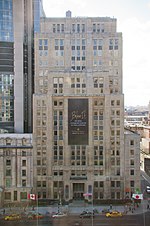Toronto Rehabilitation Institute
1998 establishments in OntarioHospitals affiliated with the University of TorontoHospitals established in 1998Hospitals in TorontoUse Canadian English from April 2021

Toronto Rehabilitation Institute (TRI or commonly Toronto Rehab) is the largest rehabilitation hospital in Canada. Owned and operated by the University Health Network (UHN), Toronto Rehab provides patients with rehabilitation care, helping people rebuild their lives and achieve individualized goals following injury and disability. It is composed of five sites across Toronto, which are: Bickle Centre (130 Dunn Avenue), Lakeside Centre (150 Dunn Avenue), Lyndhurst Centre (520 Sutherland Drive), Rumsey Centre (345 and 347 Rumsey Road), and University Centre (550 University Avenue).
Excerpt from the Wikipedia article Toronto Rehabilitation Institute (License: CC BY-SA 3.0, Authors, Images).Toronto Rehabilitation Institute
University Avenue, Old Toronto
Geographical coordinates (GPS) Address External links Nearby Places Show on map
Geographical coordinates (GPS)
| Latitude | Longitude |
|---|---|
| N 43.65661 ° | E -79.389846 ° |
Address
Toronto Rehab
University Avenue 550
M5G 1X3 Old Toronto
Ontario, Canada
Open on Google Maps






